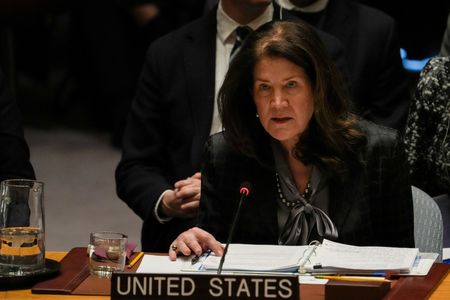LONDON (Reuters) – The rush to cut interest rates at major central banks slowed to a trickle in April, as policymakers faced uncertainty on the outlook for economic growth and inflation in the wake of escalating trade tensions.
Two of the five central banks overseeing the 10 most heavily traded currencies that held meetings in April – the European Central Bank and the Reserve Bank of New Zealand – lowered interest rates by a cumulative 50 basis points.
Rate setters in Australia, Japan and Canada left benchmarks unchanged, while central banks in Sweden, Switzerland, Norway, Britain and the United States did not meet in April. In February, half of the G10 central banks cut interest rates.
The main focus now shifts to the U.S. Federal Reserve, which concludes its rate setting meeting later on Wednesday.
“The Federal Reserve confronts (a) sharpening policy tradeoff between weaker activity and sticky inflation at its meeting this week as seen in the Q1 GDP data,” said Jean Boivin, head of the BlackRock Investment Institute.
The total tightening for the year across G10 central banks stands at +25 bps through one hike by Japan, while the tally of cuts stood at -325 bps across 12 moves, Reuters calculations show.
Emerging markets painted a similar picture, with the scale of easing slowing down across the Reuters sample of 18 central banks in developing economies.
Four out of the 13 central banks holding meetings cut interest rates. India, Thailand, the Philippines and Colombia all shaved 25 bps off their key rates, while another eight kept rates unchanged.
“The gyrations of the dollar, Fed uncertainty and fears that tariff diplomacy will fuel capital outflows have introduced a note of caution in some recent emerging market central bank decisions,” said Jon Harrison at TS Lombard, pointing to both South Korea and Indonesia keeping rates on hold despite low inflation and a deteriorating growth outlook.
Meanwhile, Turkey delivered an unexpected 350 bps bumper rate hike to stem outflows following domestic political turmoil.
The latest move in Turkey, as well as two rate hikes by Brazil since the start of the year, took the total amount of tightening delivered so far in 2025 to +550 bps.
On the easing side, emerging market central banks elsewhere have delivered -850 bps of reductions through 14 cuts.
(Reporting by Karin Strohecker; Editing by Alex Richardson)











